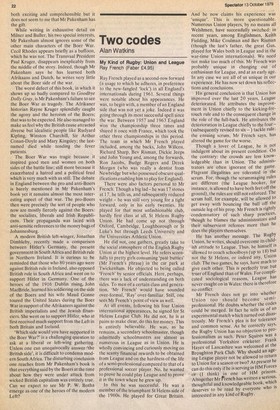Two codes
Alan Watkins
My Kind of Rugby: Union and League Ray French (Faber £4.95) Ray French played as a second-row forward (a usage to which he adheres, in preference to the new-fangled 'lock') in all England's internationals during 1961, Several things were notable about, his appearances. He was, to begin with, a member of an England side that was not yet a joke. Indeed it was going through its most successful spell since the war. Between 1957 and 1963 England won the championship three times and shared it once with France, which took the other three championships in this period. The team in which Mr French played included, among the backs, John Willcox, Richard Sharp, Bev Risman, Dickie Jeeps and John Young and, among the forwards, Ron Jacobs, Budge Rogers and Derek Morgan (who was really a dentist from Newbridge but who possessed obscure qualifications enabling him to play for England).
There were also factors personal to Mr French. Though a big lad — he was 17 stones at 17, he tells us, and subsequently reduced weight — he was still very young for a tight forward, only in his early twenties. He played for that most unfashionable club, hardly first class at all, St Helens Rugby Union. He had come up not through Oxford, Cambridge, Loughborough or St Luke's but through Leeds University and the Universities Athletic Union.
He did not, one gathers, greatly take to the social atmosphere of the English Rugby Union at the highest level. He refers scornfully to pretty girls consuming 'pate butties' (Mr French's phrase) in the car park at Twickenham. He objected to being called 'French' by senior officials. Here, perhaps, there was a lack of understanding on both sides. To men of a certain class and generation, 'Mr French' would have sounded over-formal, 'Ray' over-familiar. Still, one sees Mr French's point of view as well.
At all events, following his four Union international appearances, he signed for St Helens League Club. He did not, he is at pains to make clear, do this for money. This is entirely believable. He was, as he remains, a secondary schoolmaster, though admittedly schoolmasters are almost as numerous in League as in Union. He is wholly convincing and curiously moving an the scanty financial rewards to be obtained from League and on the hardness of the life of a semi-professional compared to that of a professional soccer player. No, he wanted to prove he could play League and to prove it in the town where he grew up.
In this he was successful. He was a member of the triumphant St Helens side of the 1960s. He played for Great Britain. And he now claims his experience was 'unique'. This is more questionable. Numerous Union players, by no means all Welshmen, have successfully switched: in recent years, among Englishmen, Keith Fielding, Mike Coulman and Bev Risman (though the last's father, the great Gus, played for Wales both in League and in the war-time Union internationals). We need not make too much of this. Mr French was probably unique in changing out of enthusiasm for League, and at an early age. In any case we are all of us unique in our experience. He has now set down his reflections and conclusions.
His general conclusion is that Union has improved over the last 20 years, League deteriorated. He attributes the improvement in Union chiefly to the kicking-fortouch rule and to the consequent change in the role of the full-back. He attributes the deterioration in League chiefly to the four — (subsequently revised to six —) tackle rule: the ensuing scrum, Mr French says, has altered the game for the worse. Though a lover of League, he is not indulgent about its present condition. On the contrary: the crowds are less knowledgeable than in Union. The administrators are often ignorant of the game. Flagrant illegalities are tolerated in the scrum. For, though the scrummaging rules are different (the League hooker, for instance, is allowed to have both feet off the ground), the rules are still not enforced. The scrum half, for example, will be allowed to get away with bouncing the ball off the outside leg of his prop. Mr French is rightly condemnatory of such sharp practices, though he blames the administrators and their subservient referees more than he does the players themselves. He has another message. The Rugby Union, he writes, should overcome its childish attitude to League. Thus, he himself is allowed to coach schoolboys (up to 18) but not the St Helens, or indeed any, Union club. The two games, he says, have much to give each other. This is perfectly true but truer of England than of Wales. For complicated sociological reasons, League has never caught on in Wales: there is therefore no conflict. Mr French does not go into whether Union too should become semiprofessional. He doubts whether the codes could be merged. In fact he tells us of an experimental match which turned out disastrously. Mr French's plea is for tolerance and common sense. As he correctly says, the Rugby Union has no objection to professionalism as such. Peter Squires was a professional Yorkshire cricketer. Frank Hayes of Lancashire was welcomed at the Broughton Park Club. Why should an ageing League player not be allowed to return to Union for a season or two? At present he can do this only if he is serving in HM Forces or (1 think) in one of HM prisons. Altogether Mr trench has written a serious, thoughtful and knowledgeable book, which deserves to be read by everyone who is interested in any kind of Rugby.


































 Previous page
Previous page